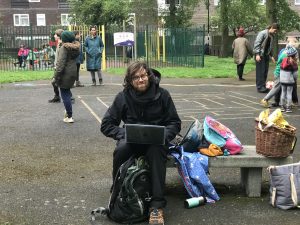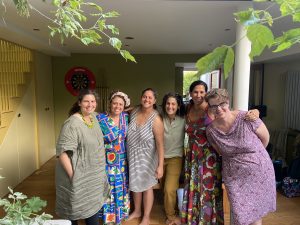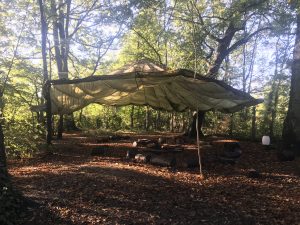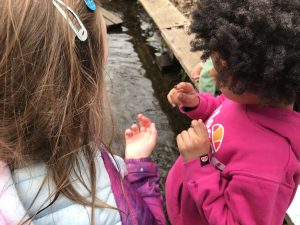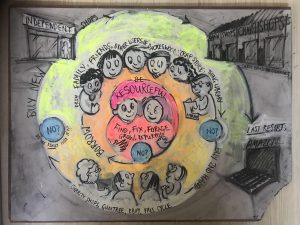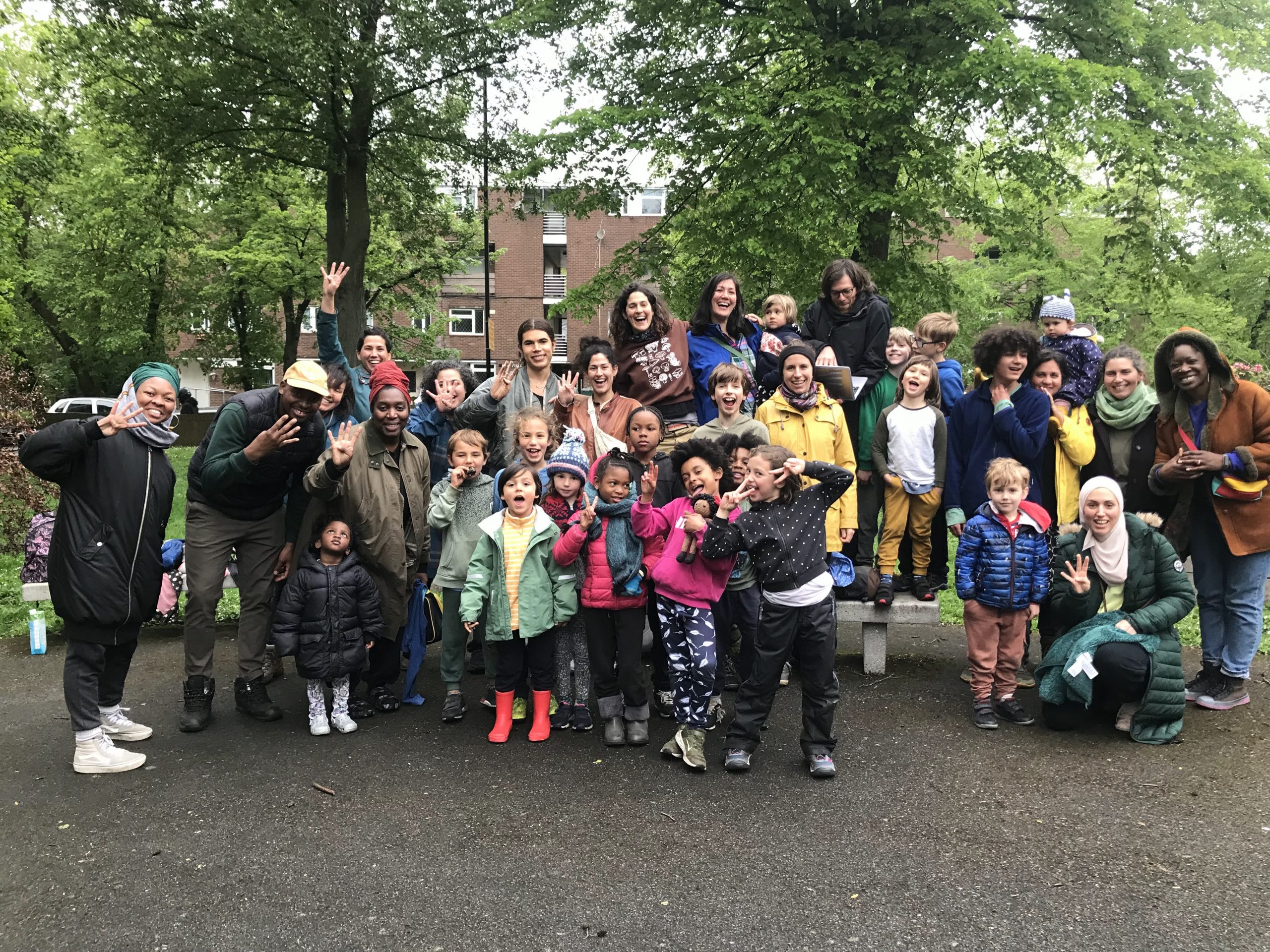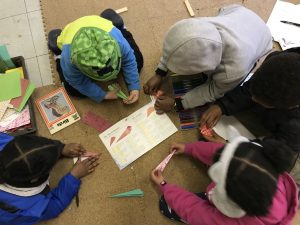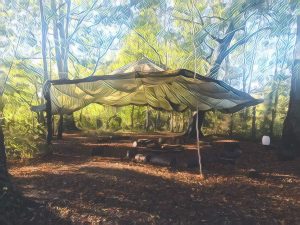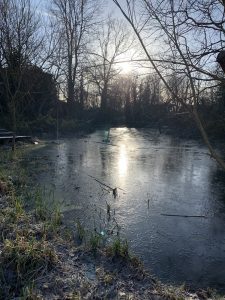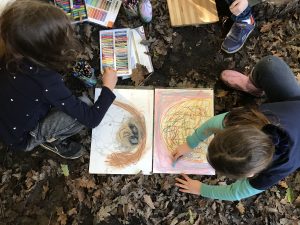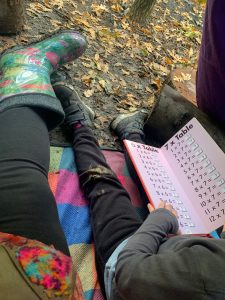READING BACK OVER SOME OF THE BEAUTIFUL WORDS RECEIVED
These past couple of weeks, some members of the FWG holding team have been building an application for funding, with the view to be able to share the practice of Nature Play with more of the community in Lewisham, particularly targeting those families from low income households. As part of the application process, we collected some of the feedback from previous attendees and hosts.
What the parents said;
“My children participated in Nature Play for two years prior to starting school. They both grew in confidence as a result. Importantly, they became more skilled at conflict resolution between them and their peers. Teachers have commented on how ready for school both children have been. Personally, I found the weekly sessions were an important moment for on-going reflection on my own parenting in a supportive non-judgmental environment, helping me listen to and support the needs of my children. The sessions had an impact in and of themselves, but also through the week on parenting.”
Nature Play Parent.
“My son was hyperactive as a toddler and the nature playgroup was the only activity that he could access and enjoy. It provided a friendly space with familiar faces and endless opportunities for free play. There are proven benefits of spending time in nature for children with ADHD, and I believe it’s really helped him develop calm and concentration needed for school, as well as gain friendships that have lasted to this day.”
Nature Play Parent.
“My son attended Nature Play sessions – several years ago now – from when he was around 2 years old. It was a weekly appointment that we both looked forward to. It was lovely to walk in the woods and meet other parents and children. I really liked that the sessions were regular, same day and same time every week. They were free and had a starting time but no ending time. We were all walking in the woods and chose a spot to sit on and have a picnic. The children started to play and the parents were able to relax and be in nature. I loved socialising and my son was always happy to go. He met many friends there and learned to play in nature freely. I learned to observe him play and intervene and help him only if there was a danger. This allowed me to learn to trust myself and him very well and to spend some relaxing time in the woods. My son benefited immensely from going to the woods weekly, the walk there from home allowed him to take pace and arrive there already relaxed. He then socialised and learned to mediate and compromise by playing with children of different ages. His gross and fine motor skills developed a lot from being in contact with nature.’
“My daughter attended nature play sessions from the age of 1 to 5. This time was so important for me to understand her and the way she learnt and the way she worked. Before attending Nature Play I was often comparing her to other children, and I used to worry that she was not doing things quick enough or energetically enough compared to other children, and was starting to push her and encourage her beyond her comfort zone. However, when I started Nature Play the hosts helped me to relax and to trust her more, and I was able to allow her to follow her own process for learning. For example, when others were climbing a certain tree, I saw that she watched for a couple of weeks before attempting it herself – now I know that she learns a lot through observing first rather than doing – then she tried little by little, and so I knew I could trust her, as she was never doing anything she couldn’t manage all by herself. She made her way bit by bit each week. Because she found her own way to It was beautiful to understand this about her, and now she is extremely confident when learning a new thing – she takes her time, and does it methodically and without stress.” Nature Play Parent.
“My eldest child is very sensitive and introverted, suspected to be on the spectrum. Nature play has been extremely helpful in supporting his development. The area I find more surprising is exactly the social! The natural environment makes him feel confident with peers in a way no other structured indoor play contexts manages. Nature Play estimates his inquisitive self and I know it’s where I/ any other trusted adult in the space can contribute easily to his growing awareness of the world around him- skills and knowledge of how we belong and live in this world.
Those learning and appreciation of nature as learning lived space continues until today. He enjoys long walks in nature with family & friends and keeps that unique eye to what is around him along the way. He is aware of seasons, cycles and happy to share them with the higher complexity of what he has learned so far. Currently, he is studying for his GCSEs, amongst his options he has chosen Photography. Interestingly enough, most of the photographs he chooses to write about and analyse are those of artists picturing broad landscapes, natural textures and natural light that gets reflected in details of the living world. It is just beautiful to witness how nature play could have potentially been one of the fostering elements in his natural gift and sense of belonging to where he is now socially-emotionally and skills competent.”
Nature Play Parent
“The most significant change for me, since attending nature play, has been to grow in trust. Trust in myself, in my daughter, and in others. That’s significant for me because before, after a semi-complicated birth with feeding issues, I was not trusting myself as a new mother, and following different role models I had in my life – sister-in-laws, mother-in-laws, friends etc. added with lots of overthinking and overanalysing, so I was putting myself in conflict with my instincts, and worrying a lot! The consequence is that although I was following her in lots of ways, I was not fully trusting my daughter to know what she needed and wanted, and that she was driving her own development. So I really can’t thank the Nature Play hosts enough, and all those who keep nature play going! I have relaxed into myself, and into appreciating Maya for who she is, and found our conversations so helpful, finding like-minded people who I can be myself around. Wonderful people who I treasure also because of the way they speak with and treat my daughter – knowing that she has these adults modelling such respect. Above all just to observe and to witness what the children do when grown-ups let them be, has been my greatest teacher. I think in the background, growing a connection with a place like Sydenham Woods has helped with all this as well, a grounding.” I tried to take what I saw and learnt from nature play into all areas of parenting – it also impacted my husband’s attitude and approach and has led me into being passionate about childhood development in my career! Maya took a long time before she left my side, and started climbing and exploring – the Nature Play hosts helped me to appreciate this, and her, and not to wish it were otherwise. It helped me learn crucial things about Maya – that she needs lots of time to observe everything going on, before choosing and making her way into it. That this is not ‘shy’, or a lack of confidence.“
Nature Play Parent.
Testimonies from Nature Play hosts
“I learned to ‘sit’ with myself. To self regulate. This opened up a whole host of research into ‘the uneasiness of observing, the fear of stillness and just being.’ Went down a rabbit hole of learning about how dis-regulation/unresolved traumatic responses show up in myself and others. Still learning. I’m still fascinated.”
Nature Play Host.
“I definitely saw an impact in confidence – that children became more open to exploring things when they were allowed to do this at their own pace. Also motor skills – very obvious progress in some kids re jumping, climbing.”
Sabira, Nature Play Host Southeast London.

